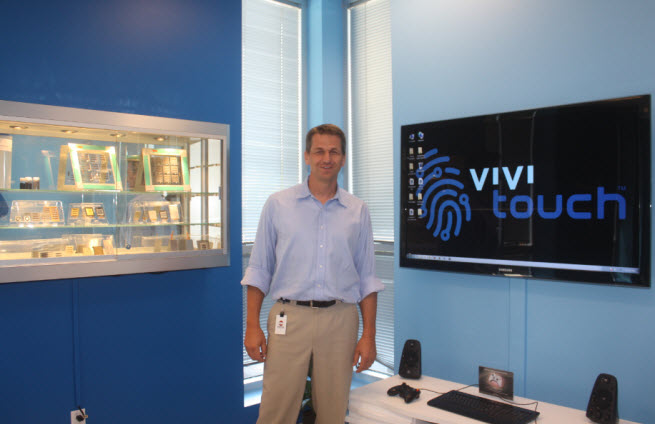Haptic feedback, or touch vibration sensors, have been built into game controllers for years. But now they’re also being used to improve the quality 0f bass sounds in high-end audio headphones.
Artificial Muscle is unveiling the audio application for its ViviTouch technology today, which makes the speakers in the headphones vibrate as if they had the benefit of a subwoofer. I listened to a demo version of the technology and felt the vibrations in my ears.
The company plans to show off the audio technology at the E3 trade show coming up on June 4 in Los Angeles. It is doing so because gamers are likely to appreciate the better sound quality. Artificial Muscle is in talks with multiple headphone makers and expects the technology will reach consumers later this year.
“You get a little buzz in your ear and it makes the bass sound better without forcing you to crank the volume all the way up,” said Dirk Schapeler, chief executive of Artificial Muscle, in an interview with GamesBeat.
Artificial Muscle is a partner with Immersion, a pioneering haptics firm that has a lot of patents in the fundamental technology behind touch feedback. Artificial Muscle, on the other hand, has developed technology for putting an actuator, or tiny motor, on a thin plastic film. The company can print circuitry that, when you apply power to it, makes a motor move back and forth. When attached to a solid mass such as a battery, it can make a device vibrate.
“Immersion develops the IP for the platforms such as Android,” said Schapeler. “We create the technology and energy-efficient actuator to bring it into mobile devices.”
The advantage is that it consumes 70 percent less energy than a typical motor; it also moves a lot faster. By the time you get a touch effect from a typical motor, the image associated with it may be gone from a screen. But the Artificial Muscle actuator can respond within 5 milliseconds.
“When an event happens in a game, you can feel it immediately when you use our chips,” said Schapeler. “We can also generate a broad range of effects.”
Artificial Muscle was founded in 2004 as a spinoff from the famous Silicon Valley research lab SRI. It was acquired by Bayer Material Science in Germany. At the outset, Artificial Muscle was attacking the markets for small electrical motors, or actuators; the market for sensors; and energy generators. Last fall, it launched its TouchSense 5500 actuator. It is being used in small pumps and valves in medical devices.
In consumer markets, Artificial Muscle is targeting gaming and audio. One application, pictured right, is a vibration-generating case for an iPod Touch. It automatically adds touch vibration effects when you touch a control button on the iPod Touch’s screen. Tens of thousands of those cases have been shipped to consumers.
In gaming, the company builds the hardware that can be used in devices such as game controllers. Then it encourages game developers to create games that make use of the haptics hardware.
Once the software is integrated with the hardware, consumers can feel effects like the feeling of a pinball rolling across a board.
“It’s a challenge to have all of those things happen at once,” Schapeler said.
Among the cool effects that Artificial Muscle has created: throwing dice in an iPhone app and then feeling the clicking of the plastic in your fingers.
Artificial Muscle now has 55 employees, including 35 in Sunnyvale, Calif. and 20 more in Germany.
![]() GamesBeat 2012 is VentureBeat’s fourth annual conference on disruption in the video game market. This year we’re calling on speakers from the hottest mobile, social, PC, and console companies to debate new ways to stay on pace with changing consumer tastes and platforms. Join 500+ execs, investors, analysts, entrepreneurs, and press as we explore the gaming industry’s latest trends and newest monetization opportunities. The event takes place July 10-11 in San Francisco, and you can get your early-bird tickets here.
GamesBeat 2012 is VentureBeat’s fourth annual conference on disruption in the video game market. This year we’re calling on speakers from the hottest mobile, social, PC, and console companies to debate new ways to stay on pace with changing consumer tastes and platforms. Join 500+ execs, investors, analysts, entrepreneurs, and press as we explore the gaming industry’s latest trends and newest monetization opportunities. The event takes place July 10-11 in San Francisco, and you can get your early-bird tickets here.
VentureBeat's mission is to be a digital town square for technical decision-makers to gain knowledge about transformative enterprise technology and transact. Learn More


